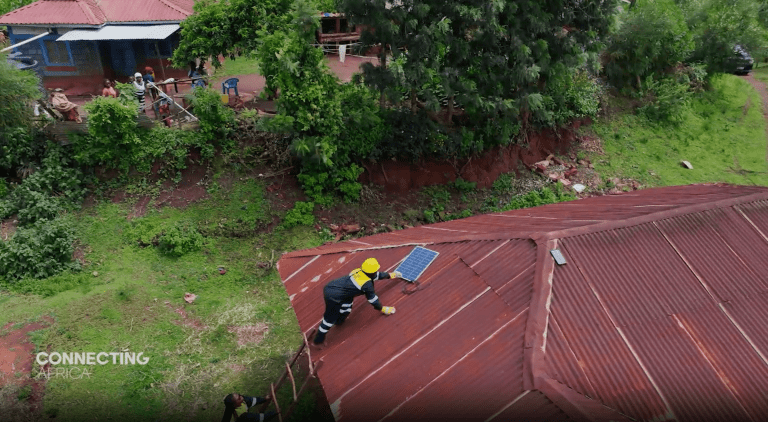
Photo
In a new episode of Connecting Africa, CNN International’s Eleni Giokos looks at the complex relationship between climate change and energy, and their effects on African trade and economic unity.
According to the International Energy Agency’s Africa Energy Outlook from 2022, the continent possesses 60% of the world’s solar resources. Despite this abundant solar potential, it accounts for only 1% of the world’s total solar panel capacity. Daniel Wetzel, Head of Unit, Tracking Sustainable Transitions, International Energy Agency explains “The major challenge for investment in Africa is financing. In Africa the cost to finance a solar project, the same exact size solar project that would be built in Europe costs three to four times more in Africa just because of the returns that are expected on financing because of the higher risks.”
From its state-of-the-art production facility in Durban, ARTsolar’s manufacturing facility is seeking to tap into the growing market for renewable energy in Africa. General Manager, Viren Gosai tells CNN, “Effectively we make 1,760 solar panels a day at peak capacity. We are able to reduce breakages, increase efficiency in terms of production and cycle times in the various stages of manufacturing, and that is how AI is being used in the manufacturing process.”
A pioneer in solar manufacturing in Africa, they are exporting panels across the continent. Gosai speaks about their reach, “A big consumer of ours is Botswana, Mozambique, Zimbabwe, Zambia, and Namibia. We are also supplying into Mauritius right now. In Nigeria… we’ve actually supplied into Nigeria for the last 10 years. We’re involved in the street lighting programs.”
ARTsolar’s success is also bringing local economic benefits with urgently required jobs. Gosai says, “The makeup of our staff is young people, right? Previously unemployed, previously disadvantaged youth that are graduates actually and have no chance of obtaining employment in this tough economic climate. We need to expand this plant exponentially and we need to do that to create the employment that is so needed in this country.”
In sub-Saharan Africa, in 2019, 25 million Africans had home solar systems. In 2022, 45 million had the systems installed, providing 4% of the electricity to African households. Kenya’s Sun King Solar is a world leader in off-grid solar systems. Victor Agandi, Vice President, Pay-As-You-Go, East and Southern Africa, at Sun King speaks about their growth, “We are currently in nine countries. We have Kenya, Uganda, Tanzania, that’s East Africa. We have Mozambique, Malawi, Cameroon, Togo. Of course, Nigeria. We have over 79 stores in Nigeria with I think almost two million households right now installed in Nigeria.”
As they connect more and more Africans, getting access to electricity is bringing lots of social and economic benefits. Agandi discusses one of these benefits, “The first time they switch on a TV system and they’re able to see live news for example, that is game changing, they’re able to educate their kids.”
According to the International Energy Agency, Africa is home to one fifth of the world’s population, yet it only receives 3% of the globe’s investment in energy infrastructure. To meet its growing demands, by 2030, investments in Africa energy network must double to $200 billion annually.
Keeping a close eye on that progress is the Director General of the World Trade Organization Ngozi Okonjo-Iweala. She explains, “Africa has these critical minerals, lithium, you name it, all of them. We also have potential for green hydrogen. Kenya is 95% clean energy. There are many African countries that have that potential. Put the two together. You can use clean energy to produce some of these critical minerals.”
Okonjo-Iweala concludes, “You can have these many micro-grids that can be more easily installed in rural areas and give our people access to light. So, let’s do that and that will take care of a large requirement. Now we come to industry, and we do have a right to industrialise. So, there we have this issue. That’s why we say that to some of our developing countries, let’s not be hypocritical. We will need a transition where gas is better than oil. Let’s use that until we have more new technology that can help us with cleaner energy.”
‘Connecting Africa’ airs on CNN International at the following times:
Saturday 3rd February 2024 at 0730 SAST
Sunday 4th February 2024 at 1930 SAST and 0600 SAST
Monday 5th February 2024 at 2245 SAST
Tuesday 6th February 2024 at 2245 SAST
Saturday 10th February 2024 at 0830 SAST and 0430 SAST
Sunday 11th February 2024 at 0830 SAST and 0530 SAST
https://edition.cnn.com/specials/business/connecting-africa
For Advert, Event Coverage, Story/Article Publication, Change Of Name & Placement In Newspapers, PR & Other Media Services
Contact Us On: WhatsApp
Send Email To: citizennewsng@gmail.com
Visit Citizen NewsNG To Read More Latest And Interesting News












